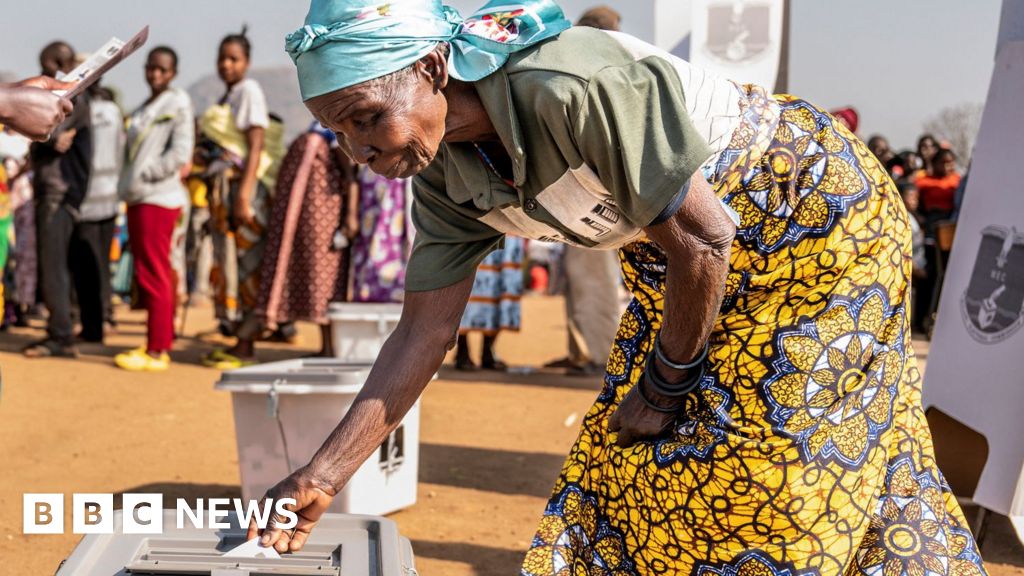
Malawi election 2025: Voters await results in presidential poll dominated by economic woes

Malawi Election 2025: Voters Await Results Amid Economic Challenges
As the sun sets on election day in Malawi, citizens are left in suspense, eagerly anticipating the results of a presidential poll that has been heavily influenced by the nation’s economic struggles. The election, which took place on a Tuesday, saw voters casting their ballots not only for the presidency but also for members of parliament and local councillors.
A Competitive Landscape
Despite the presence of 17 candidates on the ballot, the election has evolved into a contest primarily between two prominent figures: the incumbent President Lazarus Chakwera and his main opponent, former President Peter Mutharika. This election marks a significant moment for both candidates, with Chakwera seeking a second term and Mutharika, an octogenarian, aiming to reclaim the presidency he lost in 2020. The stakes are high, as a candidate must secure more than 50% of the votes to win outright; otherwise, the top two contenders will proceed to a run-off.
Economic Woes Drive Voter Sentiment
The backdrop of this election is marked by severe economic difficulties that have plagued Malawi, one of the poorest nations in the world. Voters have expressed their frustrations over rising living costs, with food prices surging by over 30% in the past year, while wages have failed to keep pace. The high inflation rate is largely attributed to a shortage of foreign currency, commonly referred to as “forex,” which has left many citizens struggling to make ends meet.
Ettah Nyasulu, a 28-year-old waitress, articulated the sentiments of many voters when she stated, “There is anger in us. I want to change this government. I want young people to be in good jobs.” Similarly, Rachel Chaguza, a 26-year-old university graduate, emphasized the need for change, pointing out the issues surrounding forex and unemployment that have become critical to the electorate.
Long Lines and Voting Challenges
On election day, thousands of Malawians formed long queues outside polling stations, eager to exercise their democratic rights. However, some areas experienced delays due to late openings and technical issues with biometric fingerprint readers, which are used to verify voter identities. The Malawi Electoral Commission (MEC) acknowledged these challenges, noting that they were manageable and that provisions were in place for those unable to write, allowing them to mark their ballots with an inked fingerprint.
Annabel Mtalimanja, the chairperson of the MEC, reported that approximately 3.7 million people, or about half of the registered voters, had cast their ballots by the time polls closed. This turnout reflects a significant engagement from the electorate, despite the economic hardships that may have dissuaded some from participating.
President Chakwera’s Campaign Promises
President Chakwera, who voted in his home village of Malembo, about 56 kilometers northeast of the capital city, Lilongwe, has made tackling the nation’s economic issues a central theme of his campaign. He has pledged to address the persistent fuel shortages and power outages that have crippled the country’s infrastructure and hampered economic activity. As he stood in line to vote alongside local residents, he was accompanied by police and military personnel, underscoring the heightened security measures in place during the election.
The Road Ahead
As the counting of votes commenced following the closure of polling stations at 14:00 GMT, the MEC is tasked with announcing the presidential results by the end of September 24, while the parliamentary results are expected by September 30. The anticipation is palpable, with voters and candidates alike awaiting the outcomes that will shape Malawi’s future.
The election has not only been a test of the candidates’ popularity but also a reflection of the urgent need for economic reform and stability in Malawi. The challenges faced by the electorate are significant, and the next president will have to navigate these issues carefully to restore faith in governance and improve the living conditions of the Malawian people.
Key Facts
– **Election Date**: The presidential election took place on a Tuesday, with polls closing at 14:00 GMT.
– **Candidates**: 17 candidates were on the ballot, with President Lazarus Chakwera and former President Peter Mutharika being the main contenders.
– **Voter Turnout**: Approximately 3.7 million voters, about half of the registered electorate, participated in the election.
– **Economic Context**: Malawi is facing significant economic challenges, including a 30% increase in food prices and a shortage of foreign currency.
– **Vote Counting Deadline**: The Malawi Electoral Commission has until September 24 to announce the presidential results and until September 30 for parliamentary results.
Source: www.bbc.com
